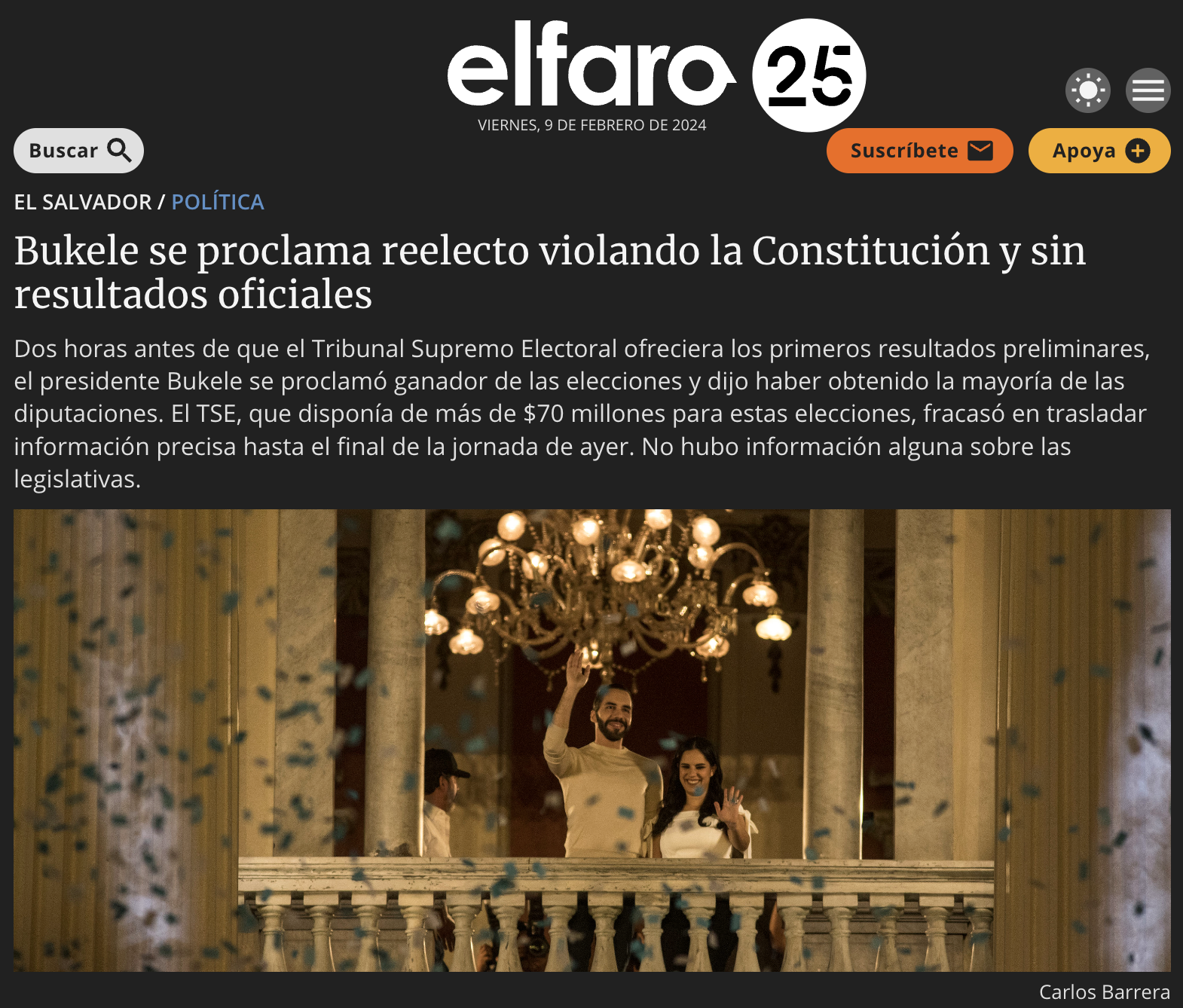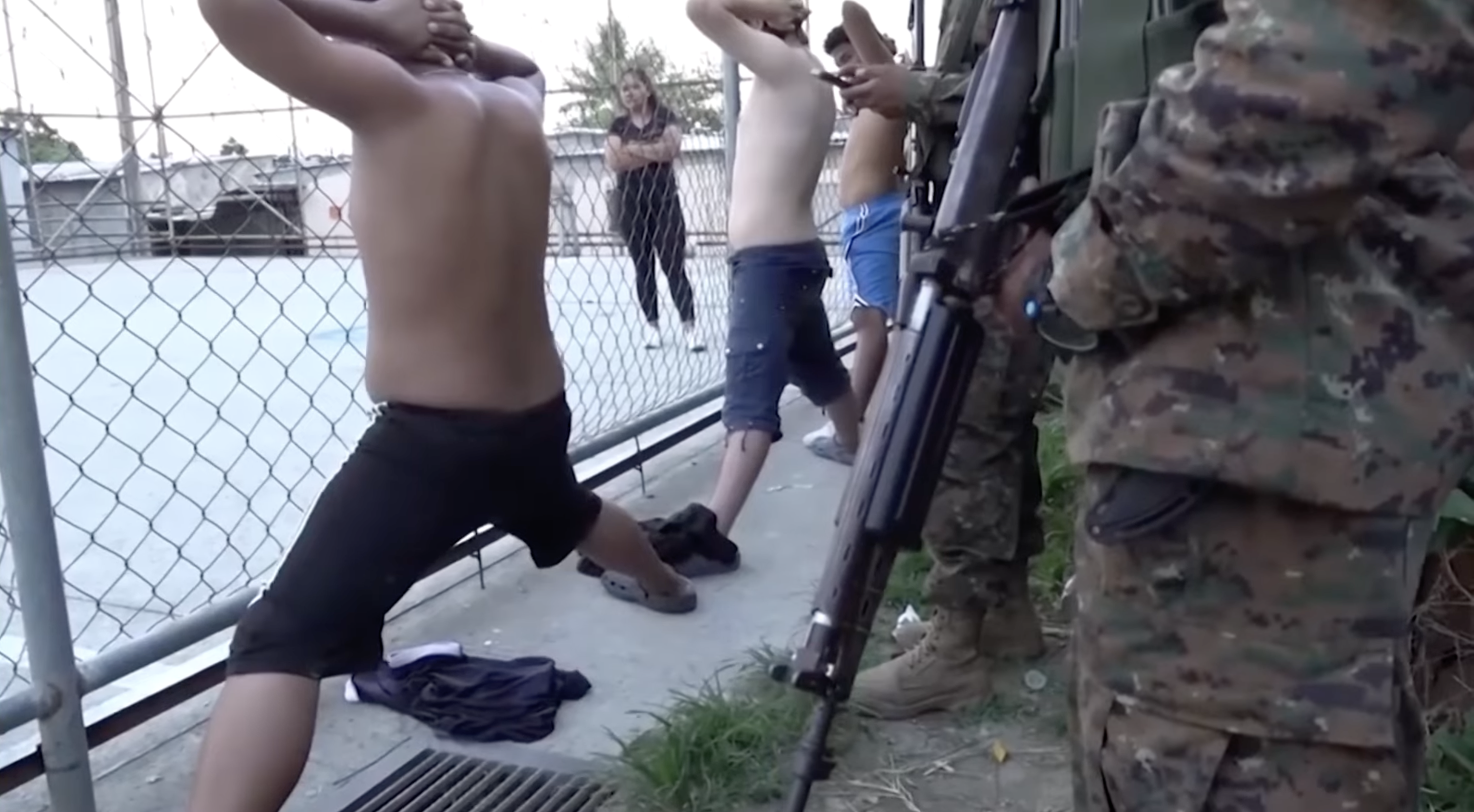The intensification of harassment against journalists, possible legal reforms to criminalize journalism and the increase in self-censorship are some factors that some journalists from El Salvador and international press freedom organizations see as possibilities for journalists after the re-election of Nayib Bukele in the Feb. 4 presidential elections.
According to preliminary data, Bukele was elected with a wide margin for a second consecutive term, despite the fact that various voices suggest that it was an unconstitutional re-election.
“We as a sector of journalists do not rule out that this is the beginning of the dictatorship, the closure of a weak democracy, of a ruler who was elected in 2019 under democratic means, but who installed an autocratic process,” Angélica Cárcamo, president of the Association of Journalists of El Salvador (APES, for its acronym in Spanish) told LatAm Journalism Review (LJR).

Bukele took advantage of his victory speech to lash out at the press and the special envoys of foreign media. (Photo: Screenshot of elfaro.net)
The electoral process showed the deterioration of the conditions for journalistic practice and guarantees for freedom of expression, according to Article 19 Mexico and Central America, Protection International Mesoamérica, Reporters Without Borders (RSF), Press Freedom Foundation of Colombia (FLIP), Free Press Unlimited, Fundamedios, Voces del Sur and the Committee to Protect Journalists (CPJ), which published a joint statement after the preliminary results of the elections were announced.
“Faced with the new period of government that begins in El Salvador, the organizations and networks that sign this statement call for the establishment of the necessary conditions and guarantees so that journalists can carry out their work, citizens are informed, and the role of the media in strengthening democracy is recognized,” the Feb. 6 statement reads.
However, some Salvadoran journalists fear that Bukele's second term will most likely bring just the opposite.
“It is very likely that Bukele will, depending on how much he feels he is losing popularity, attack the independent media that continue to resist, that there will be legal measures or reforms that could criminalize journalistic work with greater weight,” Cárcamo said.
On election day, APES recorded at least 173 aggressions against members of the press, including restriction of journalists' access to polling stations, intimidation, harassment and stigmatizing statements by public officials. According to a report from the association, those mainly responsible for the aggressions were security personnel, members of electoral boards, supporters of political parties, and other officials.
Of the 173 aggressions, 65 were against male journalists, 39 against female journalists, 36 against media outlets, six against members of APES and 27 against other unidentified press groups. The departments with the most incidents were San Salvador, Usulután, Morazán and San Miguel.
In addition, writer Carlos Bucio Borja was detained for reading out loud at a polling station the part of the Salvadoran Constitution that prohibits presidents from being re-elected. Several organizations said his detainment was a violation of his freedom of expression. Borja, who was accused of public disorder, was released on Feb. 7 after spending 72 hours in the San Salvador detention center known as “El Penalito.”
“The writer Carlos Bucio was arrested at a voting center for reading the constitution that Bukele has violated by re-electing himself as president. Authorities have not provided information about his capture. We demand his prompt release,” Juanita Goebertus, director of the Americas Division of Human Rights Watch, wrote on the social network X.
On the night of election day, Bukele used his speech before thousands of supporters gathered in front of the National Palace to attack the press and opposition. He also criticized foreign correspondents and organizations such as the Organization of American States (OAS) and the United Nations.
“It is clear to me after his speech: the next priority enemy to be destroyed by Bukele will be the independent press,” journalist Óscar Martínez of media outlet El Faro wrote on X. The independent investigative outlet was forced in 2023 to move its headquarters to Costa Rica after continuous harassment and several reported cases of spying against it.
The state of exception declared by Bukele on March 27, 2022, as part of a series of measures to combat gangs, and which has been extended to this day, has systematically led to human rights violations, according to organizations such as Amnesty International.
According to Cárcamo, for APES, the state of exception has represented abuses of power and greater restrictions on journalistic practice, especially by members of the military and agents of the National Civil Police, whose presence on the streets has increased as a result of the legal provision.
“These soldiers increasingly have more power and authority to make decisions that do not concern them. The Association has been reporting cases of restrictions on journalistic practice by these people who threaten [journalists] if they report outside prisons or even for things as laughable as taking photographs of the construction of a hospital,” Cárcamo said. “They threaten them so they will delete the images and videos, they search their personal phones. The abuse of power is something that these forces are making more constant and more natural, and no one, at least in the State, is trying to prevent that.”

Community journalist Víctor Barahona was detained during El Salvador's state of exception, accused of "collaborating with gangs". He remained in prison for more than 11 months. (Photo: YouTube screenshot)
In 2022, digital community radio journalist Víctor Barahona was arrested accused of “collaborating with gangs” and spent more than 11 months in prison, where he allegedly suffered torture. APES then denounced that Barahona's imprisonment had occurred under irregular conditions and he had been released without any release document.
A month after the state of exception was decreed, in April 2022, the Salvadoran Assembly approved reforms to the Gang Prohibition Law, which punished those who spread messages related to gangs with sentences of between 10 and 15 years in prison. These amendments, which were partially repealed in November 2023, were classified by APES as “gag reforms.”
“The entire time that [that reform] was in force it put fear into the press. That is why for many, the option is 'Better I censor myself so as not to have problems,' and obviously what is predominating is the official narrative," Cárcamo said.
Also as a consequence of this effect of fear, APES had to remove from the country – between 2022 and 2023 – 17 journalists who were publishing articles related to gangs. Three of those 17, Cárcamo said, remain outside El Salvador because they do not see it as viable to continue practicing the profession in their country. Two of them are women journalists.
Since the state of exception came into force, access to public information is another right that is suspended de facto, since officially the Law on Access to Public Information, decreed in 2011, is still in force, according to journalist Ricardo Avelar in a column for El Diario de Hoy.
This has almost completely blocked journalists' access to public data, government spaces and officials, according to the joint statement that press freedom organizations published after the elections.
On May 8, 2011, during the government of Mauricio Funes – the first left-wing government in the Central American country – the Law on Access to Public Information of El Salvador came into force, which included the creation of the Institute for Access to Public Information.
The state of exception has weakened democracy by classifying public information as “confidential” or “reserved” for the sake of national security, according to a statement from the Washington Office on Latin American Affairs (WOLA).
“When this president [Bukele] takes office, he realizes that this law must be destroyed. He then begins, in a subtle way, to block access to information,” Luis Canizalez, journalist and editor of Elementos, a magazine of in-depth journalism, told LJR. “Since he took office, we, the media, the journalists, have made hundreds of requests for information. The answer at first was that it was classified information. For the last two years, they don't even respond to you. The law has not been repealed, but in practice it does not work.”
APES also fears the possibility of the creation of new laws or reforming existing ones to monitor or hinder the work of media outlets or civil society organizations. Such is the case of the law on foreign agents that Bukele proposed in 2021.
The bill sought to require organizations that receive funds from abroad to pay a 40 percent tax on each transaction. This included independent media outlets that are financed with funds from foreign organizations.
Upon presenting the potential law, Minister of the Interior Juan Carlos Bidegain said “it will allow us to guarantee the security, national sovereignty and social and political stability of the country.”
Discussion on the foreign agents law was suspended in 2022 after international pressure.
Given the expected continuation of the hostile environment for practicing journalism that Bukele's re-election represents, Cárcamo said that there are measures that members of the press could take to protect themselves and confront attacks. Some of these measures are reorganizing, working collaboratively and grouping at the association level.

The state of exception decreed by Bukele has represented abuses of power and greater restrictions on journalistic practice, especially by members of the military and agents of the National Civil Police. (Photo: La Prensa Gráfica Noticias de El Salvador, CC BY 3.0, via Wikimedia Commons)
“Experience has told us in recent months that collaborative journalism exercises have a much greater impact, and that is something that those in power do not like due to the number of people they reach,” she said.
Canizalez agreed that joining journalists' associations is a good protection measure for small independent media. He added that keeping records of all cases of attack, threats and harassment is also a good protection practice.
“There has to be a series of documentation of concrete facts that show what is really happening,” he said. “We have been doing that [at Revista Elementos].”
Continuing to rely on international organizations to protect journalists and making human rights violations visible to the international community are other measures recommended by the APES.
“In recent months, those who have been most at the forefront of making visible the violation of human rights and questioning through journalistic work have been members of the press,” Cárcamo said. “It's like a war and we are at the front. We have no more allies for that. An independent press that, in front of the propaganda apparatus, is doing interesting things, obviously that is not comfortable for these types of anti-democratic figures.”